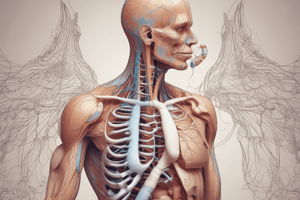Podcast
Questions and Answers
What is the primary function of the diaphragm during inhalation?
What is the primary function of the diaphragm during inhalation?
To increase the volume of the chest cavity, allowing air to enter the lungs
What is the role of the external intercostal muscles during inspiration?
What is the role of the external intercostal muscles during inspiration?
To pull the ribs outward and upward, assisting in inhalation
What happens to the diaphragm during expiration?
What happens to the diaphragm during expiration?
It relaxes and rises
What is the function of the scalene muscles during forced breathing?
What is the function of the scalene muscles during forced breathing?
What is the role of the internal intercostal muscles during expiration?
What is the role of the internal intercostal muscles during expiration?
What happens to the intercostal muscles during inspiration?
What happens to the intercostal muscles during inspiration?
What is the function of the accessory muscles during forced breathing?
What is the function of the accessory muscles during forced breathing?
What is the primary muscle of inspiration?
What is the primary muscle of inspiration?
Flashcards are hidden until you start studying
Study Notes
Respiratory Muscles
Diaphragm
- Primary muscle of inspiration
- Dome-shaped muscle that separates the chest cavity from the abdominal cavity
- Contracts and relaxes to change the volume of the chest cavity
- Increases the volume of the chest cavity during inhalation, allowing air to enter the lungs
Intercostal Muscles
- Located between the ribs
- Two types:
- External intercostal muscles: assist in inspiration by pulling the ribs outward and upward
- Internal intercostal muscles: assist in expiration by pulling the ribs inward and downward
Accessory Muscles
- Used during forced breathing, such as during exercise or when the body is under stress
- Include:
- Scalene muscles: located in the neck and help to elevate the ribs
- Sternocleidomastoid muscles: located in the neck and help to elevate the sternum
- Pectoral muscles: located in the chest and help to elevate the ribs
- Serratus anterior muscles: located in the chest and help to rotate the scapula
Muscle Actions
- Inspiration:
- Diaphragm contracts and descends
- Intercostal muscles contract and pull the ribs outward and upward
- Accessory muscles contract and help to elevate the ribs and sternum
- Expiration:
- Diaphragm relaxes and rises
- Intercostal muscles relax and pull the ribs inward and downward
- Accessory muscles relax and help to lower the ribs and sternum
Respiratory Muscles
Diaphragm
- Primary muscle of inspiration, responsible for increasing the volume of the chest cavity during inhalation
- Dome-shaped muscle that separates the chest cavity from the abdominal cavity
- Contracts and relaxes to change the volume of the chest cavity
Intercostal Muscles
- Located between the ribs
- Two types:
- External intercostal muscles: assist in inspiration by pulling the ribs outward and upward
- Internal intercostal muscles: assist in expiration by pulling the ribs inward and downward
Accessory Muscles
- Used during forced breathing, such as during exercise or when the body is under stress
- Include:
- Scalene muscles: located in the neck and help to elevate the ribs
- Sternocleidomastoid muscles: located in the neck and help to elevate the sternum
- Pectoral muscles: located in the chest and help to elevate the ribs
- Serratus anterior muscles: located in the chest and help to rotate the scapula
Muscle Actions
- Inspiration:
- Diaphragm contracts and descends
- Intercostal muscles contract and pull the ribs outward and upward
- Accessory muscles contract and help to elevate the ribs and sternum
- Expiration:
- Diaphragm relaxes and rises
- Intercostal muscles relax and pull the ribs inward and downward
- Accessory muscles relax and help to lower the ribs and sternum
Studying That Suits You
Use AI to generate personalized quizzes and flashcards to suit your learning preferences.



